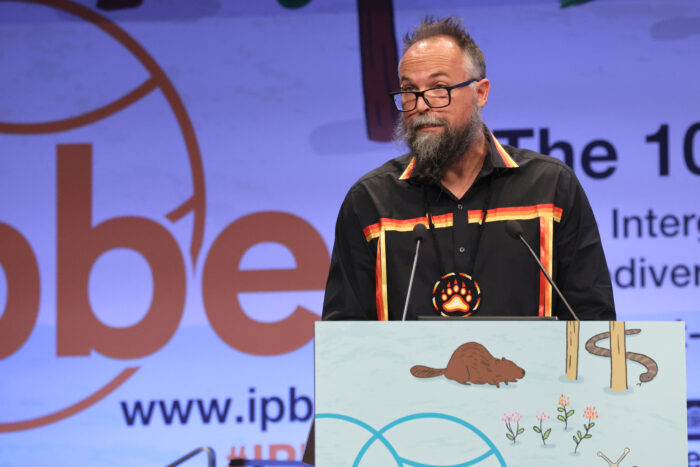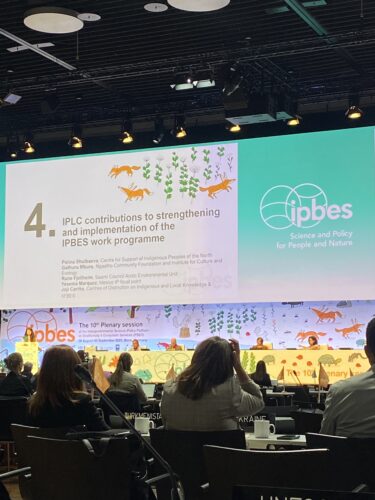Indigenous Inclusion in Science-Policy: More than Just a Seat at the Table
“Indigenous Peoples and local communities must be in a position to institute knowledge systems at IPBES.” Those words are from Dr. Kyle Whyte, Indigenous philosopher and a U.S. Science Envoy, who was given the floor to open the tenth session of the Plenary of the Intergovernmental Science-Policy Platform on Biodiversity and Ecosystem Services (IPBES 10). In his address, Dr. Whyte imagines the capacity of IPBES to institute Indigenous and Local Knowledge (ILK) in a way that extends beyond simply seeking input from Indigenous Peoples in the realm of biodiversity assessment and management.
The 10th Plenary demonstrated how IPBES distinguishes itself from other global initiatives. From its inception, IPBES has underscored its dedication to prioritizing the engagement of Indigenous and local communities and fostering dialogue among a wide range of knowledge systems. This commitment can be exemplified through one of its guiding principles which denotes that IPBES will “recognize and respect the contribution of indigenous and local knowledge to the conservation and sustainable use of biodiversity and ecosystems.”
It was in this context that we spoke with Dr. Whyte after the Plenary to reflect on how science-policy platforms like IPBES can institutionalize Indigenous and local community knowledge and catalyze transformative change.

How can we go beyond inclusivity and translate the rhetoric emphasizing the crucial contributions of Indigenous and local communities and their expertise into tangible policy changes at science-policy platforms that could institutionalize Indigenous knowledge?
Dr. Kyle Whyte: Science-policy platforms should be places where ILK holders can thrive, whether as authors, attendees, or in other roles. ILK holders must benefit in several ways. As ILK holders are accountable to the communities they come from, their involvement in IPBES must clearly benefit the well-being of Indigenous and local communities. ILK holders also benefit in ways that are analogous to how scientists benefit from their involvement in IPBES, including career fulfillment, learning, and networking. While many ILK holders may have different career objectives, it’s nonetheless true that IPBES should support equally and fairly the pathways and trajectories of all knowledge holders who volunteer their time, expertise, and ideas.
With a particular focus on early-career researchers – what can non-Indigenous researchers and scientists do to show up and support ILK in practical ways? What role in your opinion can early career researchers play in shaping science policy platforms and advocating for the integration of Indigenous knowledge?
KW: In my experience with other scientific assessments, the involvement of early-career researchers can be game-changing. I have many fantastic stories of early career authors in reports bringing completely different framings about the nature and impact of assessment processes. They created strategies for bringing in new types of knowledge into dialogue with the types of knowledge that had been more commonly reviewed and analyzed. Most importantly for me, I hope that early career researchers are respected by more senior researchers when they raise issues of ethics, meaningful engagement with stakeholders and rights holders, and respect, consent, and procedural integrity for working with ILK knowledge holders. As I meet more early career researchers who are members of Indigenous and local communities and ILK holders themselves, it is critical that IPBES welcomes them, and encourages their success.

Beatriz Lima Ribeiro, is an early career researcher and PhD Candidate in Anthropology at Indiana University whose research focuses on the bridge between indigenous participation and knowledge construction processes on nature and the environment in global environmental governance institutions. She attended the Plenary online as a Future Earth delegate as part of the community. Reflecting on her attendance, Beatriz highlights the task for non-Indigenous scholars and scientists:
“As non-Indigenous researchers, a way to support and promote the recognition of indigenous knowledge in science policy discussions is through the continuous promotion of interdisciplinarity across social and natural sciences as well as traditional knowledge. As researchers, we must acknowledge and recognize indigenous and local knowledge as historical and valuable ways of knowing that showcase aspects of environmental challenges that social or natural sciences may not take into consideration. In other words, we must deeply reflect on how we assess what is valuable knowledge in the first place, and how this has shaped policy-making so far.”
Going beyond inclusivity
The idea is not just to be inclusive. Indigenous knowledge systems are holistic and dynamic and cannot be distilled into one single definition. Instituting Indigenous and Local knowledge(s) means these communities should manifest the actual research and data, and Indigenous peoples should be elevated and empowered to be considered as regional actors and decision-makers.
What could this look like in practice?
Centering non-Western ways of thinking means decision-makers and scientists who are not Indigenous should be open to meaningful engagement and gaining knowledge from Indigenous communities. Indigenous peoples do not need to alter or validate their own ancestral and scientific knowledge into Western knowledge systems. These knowledge systems must be braided together. Centering non-Western ways of thinking means realizing that these communities are the ones that hear the ticking of the climate clock louder than most. The new IPBES report highlights that, “more than 2,300 invasive alien species are found on lands under the stewardship of Indigenous Peoples – threatening their quality of life and even cultural identities.” Capacity-building programs should be invested in so that Indigenous communities can enhance their participation in policy discussions and implementation. Free, Prior and Informed Consent (FPIC) by Indigenous communities must be obtained for projects or policies that may impact their lands, resources, or traditional practices.
“There are actually very few science-policy platforms that consider and integrate indigenous and local knowledge and expertise. IPBES has been ground-breaking here […] in bringing indigenous and local knowledge into the different assessments, and supporting workshops and dialogues to raise awareness,” says Cornelia Krug, science policy liaison for the University of Zurich Research Priority Programme Global Change and Biodiversity and Executive Director of for the bioDISCOVERY, a Future Earth Global Research Network. Krug attended the Plenary as a Future Earth delegate. Transdisciplinary approaches will be key but the foundation already exists and according to Cornelia, “this is reflected throughout the work of the platform, beginning with the conceptual framework that integrates different world views and knowledge(s).”
The core mission of IPBES is to bridge the gap between science and policy. Integrating Indigenous knowledge into science-policy platforms such as IPBES goes beyond enriching our scientific comprehension of ecosystems; it also signifies a commitment to honoring inclusive and transformative spaces and advancing environmental justice. By braiding Indigenous knowledge systems along with Western knowledge systems, we are reminded that just like ecosystems are not individual parts but a latticework of intertwining fauna and flora, so too must we foster a much-needed paradigm shift in science-policy to embrace a true transdisciplinary approach.
Banner photo credit: CGIAR Research Programme
DATE
October 12, 2023AUTHOR
Stephanie O'TooleSHARE WITH YOUR NETWORK
RELATED POSTS
IPBES Report Provides Evidence, Tools & Options to Help Governments Achieve New Global Goal on Invasive Alien Species
Future Earth at IPBES 10: Assessing Invasive Alien Species
A “Values Crisis” Underpins the Coupled Biodiversity and Climate Emergency